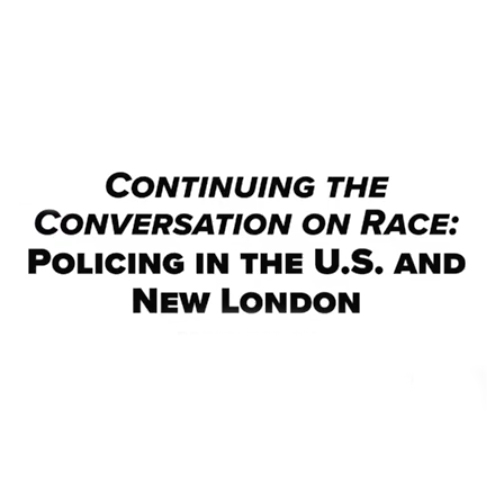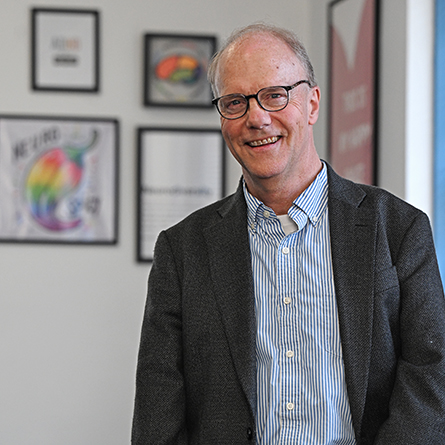
Continuing the Conversation on Race: Policing in the U.S. and in New London
The killings of George Floyd and multiple other Black Americans by police officers during the spring and summer of 2020 led to national calls for police accountability. But how do we move forward? That was the topic of discussion for local and national leaders and stakeholders yesterday during “Conversations on Race: Policing in the U.S. and New London,” a virtual, public event hosted by Connecticut College and The Day newspaper, and moderated by Izaskun Larrañeta, managing editor for The Day.
The event was an extension of Elevate: The Inaugural Social Justice Conference at Connecticut College and part of the Conversations on Race series launched in 2019 in collaboration with Conn, The Day and the U.S. Coast Guard Academy. (Watch the full recording on YouTube.)
Debo Adegbile ’91, a civil rights attorney and a member of the United States Commission on Civil Rights and former Director of Litigation of the NAACP Legal Defense and Educational Fund, and Ronald Davis, former director of the U.S. Department of Justice’s Office of Community Oriented Policing Services under the Obama administration, opened the proceedings.
Adegbile, vice chair of Connecticut College’s Board of Trustees and a partner at WilmerHale law, and Davis worked together with the U.S. Mayors Conference to produce an extensive report on police reform and racial justice.
“As a black man I have concerns, as a father of black children I have concerns, and as a cop who knows that a lot of cops are trying to do the right thing I have concerns,” Davis said. “These tough conversations are very necessary.”
Adegbile said communities and police forces share the common goal of public safety, and they can and should work together to achieve it.
“In order to do police work, in order to solve crimes, we need the participation of the community,” he said. “There needs to be a context, there needs to be an exchange, there needs to be a willingness to come forward and to support the efforts of law enforcement. One of the ways … we can move forward is to have greater dialogue, to have lines open.
“I think every effective police chief and police leader will say that that dialogue is invaluable and necessary to enhance public safety. So, the question is, how do we construct something that allows for that exchange to happen in productive ways?”
That was the charge of the New London Public Safety Policy Review Committee, which recently released a 17-page report with a list of recommendations aimed at providing more community oversight and police accountability, including the formation of a civilian police review board and the creation of a police commission. Members of the committee were appointed by Mayor Michael Passero ’79 M’89 in June 2020, and it’s chaired by Connecticut College’s Dean of Institutional Equity and Inclusion John McKnight.
“We approached this as a listening opportunity initially,” McKnight said during the Conversation on Race. “I think there was general agreement that what we need in this country is a totally new vision for how to keep our communities safe, but until we could really develop that, what could we do in the meantime?”
While calls to “defund the police” have become a political lightning rod, the panelists agreed that there is an overreliance on police to solve social problems. That leads to poorer outcomes, but it is also unfair to the officers who are responding to situations they aren’t trained for, Davis said.
“Homelessness is not a crime. Addiction is not a crime. Mental illness is not a crime. So, [police] need to get out of that business,” he said.
Jeanne Milstein, director of New London Human Services, said that 40% of all police calls in New London are mental health related.
“So now we have police officers who are asked to intervene because when a family doesn’t know what to do or a neighbor doesn’t know what to do when someone is in crisis, they call 911,” she said.
The panelists discussed several of the recommendations in the New London Public Safety Policy Review Committee and acknowledged that they may be difficult to implement for various reasons.
But change requires hard work, Adegbile said.
“Folks speak about this summer and call it a reckoning. But it’s only a reckoning if you actually address and deal with the thing in front of you,” he said.
“Staying on it, improving the conversation, making some of the tough choices, maybe looking at some reallocation, but also support in the ways law enforcement needs support to do a better job—it is this work that is going to lead to better public safety. And public safety is the goal. Public safety will help both officers feel better and the community feel better. You can achieve both things … there are commonalities, and there are ways we can do this to make our cities better. And New London can be one of the cities leading the way.”

